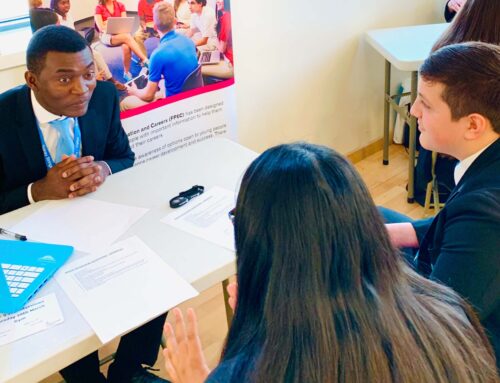
Undertaking CPD is not just about going on a course; being open to trying new ways of learning is an important skill to develop. Last time in the A-Z of CPD series we looked at a range of different activities from ‘helping colleagues’ to ‘lunching’. This week we help you consider alternative activities that you can do as part of your own continuous professional development, starting at the letter ‘M’.
Taken from CPD for the Career Development Professional by Siobhan Neary and Claire Johnson.

M
MENTORING
What this is:
A relationship in which a more experienced or more knowledgeable person helps to guide a less experienced or less knowledgeable person who wants to learn.
How can this be used as CPD:
Having a mentor can provide a means of professional support. Someone with whom to sound out your ideas and from whom you can also learn. Your mentor can provide you with advice and encouragement; help you to solve problems for yourself; encourage you to reflect on your practice; and help you to improve your self-confidence.
Being a mentor yourself can also be a great source of CPD, and you may find that many of the interpersonal skills you already have as a career development practitioner will equip you well for this role. Being a mentor can give you the opportunity to reflect on your own practice; enhance your role satisfaction; help you to develop professional relationships; enhance recognition from your peers; provide the satisfaction of making your experience available to another person; widen your knowledge of the sector and the way it works; and enhance your self-confidence in your professional skills and knowledge. You may also learn new ideas and methods from your mentee and make new contacts that will enhance your own professional network.
MOOCs
What this is:
A MOOC (Massive Open Online Course) is an online course aimed at unlimited participation and open access via the web. In addition to traditional course materials, such as filmed lectures, readings and problem sets, many MOOCs provide interactive user forums to support further discussion among participants.
How this can be used as CPD:
Determining your CPD needs and then finding a relevant MOOC, or just seeing what MOOCs are available, and participating to see what you can learn and use in your professional practice.
Useful examples/websites:
N
NATIONAL GUIDANCE RESEARCH FORUM
What this is:
The National Guidance Research Forum (NGRF) facilitates knowledge sharing and professional development, together with labour market information (LMI) for those interested in career guidance research and practice.
How this can be used as CPD:
Look at the website and explore what is on offer, e.g. LMI Online Learning Modules can help you to understand how to use LMI in your role.
Useful examples/websites:
NATIONAL INSTITUTE FOR CAREER EDUCATION AND COUNSELLING (NICEC)
What this is:
NICEC is a fellowship of people committed to understanding and developing career education and guidance practice and policy in the UK and across the globe. Their website aims to inform visitors of latest developments, NICEC events and news related to the NICEC Journal. Fellows and NICEC members have access to the journal and event materials via the members’ site. Twice a year a joint NICEC/CDI conference is held which is free to attend, and CDI members receive the NICEC Journal twice a year free of charge.
How this can be used as CPD:
Attending the conferences and seminars can really help to stimulate your thinking, as these are based on the latest research and how this can be used in practice. Articles in the NICEC Journal are also based on the latest research and thinking and are a very useful source of information. Attending events or reading articles and reflecting on how these can influence your practice is a good source of CPD.
Useful examples/websites:
NATIONAL OCCUPATIONAL STANDARDS
What this is:
National Occupational Standards (NOS) are statements of the skills, knowledge and understanding needed for effective performance in a job role and represent a consensus view and description of best practice for each particular function, having been developed and agreed with a range of employers and stakeholders representing the sector area. They can be regarded as the benchmark of competence required in the sector and form the key component of many qualifications.
How this can be used as CPD:
You can use the NOS: CD or others to provide a means of determining gaps in knowledge, experience and skills; NOS offer an objective process for determining your training needs and support your professional development.
Useful examples/websites:
NETWORKING
What this is:
Using a supportive system of sharing information and services among individuals and groups having a common interest; this can be either in person or virtual.
How this can be used as CPD:
You can ask questions; share/learn new knowledge; promote your own business/expertise; develop your personal skills, including the use of technology to network; make connections that will be useful for your clients or your own business; and trade CPD opportunities. Setting up your own network can also help with all of the above as well as helping to develop organisational and communication skills.
Useful examples/websites:
NEWSLETTERS
What this is:
Provide information of interest to members, customers, or employees. Many newsletters are now delivered electronically.
How this can be used as CPD:
These can be an excellent way to keep up to date about developments in the sector, forthcoming training events, research, employer news, vacancies, new resources and suggestions on how to get involved in the sector. The fact that an email newsletter drops into your inbox saves you time, as this information is instantly accessible. Electronic newsletters often have links for further information if you want to know more about a particular topic.
Useful examples/websites:
- CDI News via email (members only)
- iCeGS: www.derby.ac.uk/icegs
- Education and Employers: www.educationandemployers.org
- Pearson UK Policy Watch: https://www.pearson.com/uk/about-us/news-and-policy/policy-watch.html
- Mindtools: www.mindtools.com
- The Guardian online has a number of newsletters on career topics.
O
OBSERVATIONS OF PRACTICE
What this is:
Observing another practitioner undertaking a particular activity.
How this can be used as CPD:
Simply watching how someone else does their job can be a useful way to look at your own practice. What do they do that you could incorporate in your role? Is there anything they do that you would do differently? Being able to discuss what has taken place is also a useful way of developing our own skills and knowledge. Being observed yourself and then having such a discussion can also help you to reflect on your own practice and how this can be developed. NB: This is different to assessment, where specific criteria are used in the observation of the practice and judgements made regarding competence.
Useful examples:
- Reid, H. (2007) ‘Structuring support and supervision for different contexts’. In: Harrison, R., Benjamin, C., Curran, S. and Hunter, R., eds. Leading Work with Young People. London: Sage Publications Ltd. pp. 164–76. ISBN 9781412946049.
ONLINE LEARNING
What this is:
Learning which you do via the internet. There is a huge variety of different programmes available.
How this can be used as CPD:
Having determined your CPD needs, you can see what online learning may be available to meet them. You need to consider how you learn best, how you will evidence your learning and how you can put this into practice and reflect on what you have learned.
Useful examples:
- See above re MOOCs and below re OpenLearn.
- The CDI CPD Resources section for CDI members has information on various online learning opportunities and a guide to online learning.
OPENLEARN
What this is:
Free online learning from The Open University. OpenLearn gives you free access to course materials and expert opinion on topical issues.
How this can be used as CPD:
Having determined your CPD needs, you can look at this site and search to see what is available that may help you.
Useful examples/websites:

Emma Davies works within the editorial department at Trotman Publishing. Graduating from her Masters degree in 2017, she is familiar with all aspects of the student journey through university. She is passionate about helping students find the right career, and was a member of the SYP’s inaugural committee in the South West.





